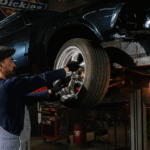A broken garage door spring can bring your daily routine to a halt. Those springs are what make your door open and close smoothly, and when they snap, you’ll need to replace them fast. But how much does garage door spring replacement cost? It’s a question many homeowners ask when faced with a stuck door. This article breaks down the costs, what affects them, and how to handle the process, all in a clear, straightforward way. Let’s dive into what you need to know to get your garage door back in action without breaking the bank.
What Are Garage Door Springs?
Garage door springs do the heavy lifting for your door. They balance the weight, making it easy to open and close, whether manually or with an opener. There are two main types: torsion springs, which sit above the door and twist to lift, and extension springs, which stretch along the sides. Torsion springs are more common in modern homes and tend to last longer, while extension springs are found in older setups.
Springs wear out over time, usually after 10,000 to 20,000 cycles (one cycle is an open and close). When they break, the door might not move or feel super heavy. Replacing them is a must to keep your garage functional. Knowing the type of spring your door uses helps you understand the replacement process and cost. Most pros recommend torsion springs for their durability, but both types require careful handling since they’re under high tension.
Average Cost of Spring Replacement
The cost to replace garage door springs typically ranges from $150 to $350, with most homeowners paying around $200 to $300. This includes parts and labor. Torsion springs usually cost $50 to $100 each, while extension springs are cheaper, around $20 to $50. Labor makes up a big chunk, often $100 to $200, since the job takes skill and about an hour or two. Prices depend on where you live—urban areas like New York might hit the higher end, while smaller towns could be closer to $150.
If you need two springs replaced (common for torsion setups), costs can climb to $300 or more. Some companies charge extra for emergency calls or same-day service, adding $50 to $100. Always get a written quote before work starts to avoid surprises. While DIY replacement might seem cheaper, it’s risky due to the springs’ tension, so hiring a pro is usually worth the price for safety and quality.
Factors That Affect the Cost
Several things can change the price of replacing garage door springs. First, the type of spring matters—torsion springs are pricier than extension springs because they’re more complex and durable. The size of your door also plays a role; larger or heavier doors, like those for two-car garages, need stronger springs, which cost more. Your location is another factor—big cities have higher labor rates than rural areas.
The condition of your garage door system can bump up costs too. If other parts, like cables or rollers, are worn out, you might need extra repairs, adding $50 to $150. Some companies include a tune-up in the price, checking tracks and openers, which can raise the bill but save money long-term. Emergency or weekend service often comes with a premium. Getting quotes from a few local pros helps you compare and find a fair deal for your specific setup.
DIY vs. Professional Replacement
You might be tempted to replace garage door springs yourself to save money, but it’s not always a good idea. Springs are under high tension and can cause serious injury if mishandled. A DIY kit might cost $50 to $100 for parts, but you’ll need special tools and know-how to do it safely. One wrong move could damage your door or hurt you, making it a risky choice for most homeowners.
Hiring a professional is safer and often faster. Pros have the tools and experience to replace springs in an hour or two, ensuring the job is done right. They also spot other issues, like worn cables, that could cause problems later. While it costs more—$150 to $350 versus $50 for DIY—the peace of mind and safety are worth it. If you’re set on DIY, research thoroughly and follow safety guides, but for most, a pro is the smarter pick.
How to Find a Reliable Service
Finding a trustworthy company for garage door spring replacement is key to getting a fair price and quality work. Start by searching “garage door repair near me” online or checking platforms like Yelp for local businesses with good reviews. Look for companies with 4- or 5-star ratings and read comments to see if they’re prompt and honest. Ask friends or neighbors for recommendations—word-of mouth is gold.
Check if the company is licensed and insured, which protects you if something goes wrong. Get at least three quotes to compare prices, but don’t just pick the cheapest—look for clear communication and detailed estimates. A good company will inspect your door before quoting and explain what needs fixing. Avoid anyone pushing unnecessary repairs or refusing to give a written quote. Local businesses often care more about their reputation, so they’re a solid bet for reliable service.
Tips to Save on Spring Replacement
Saving money on garage door spring replacement is possible with a little planning. First, get multiple quotes—three or more—to find a fair price. Some companies offer discounts for first-time customers or seasonal specials, so ask about deals. Regular maintenance, like lubricating springs and tracks every six months, can extend their life and delay replacement, saving you hundreds over time.
If your door has two springs, replacing both at once (even if only one is broken) can prevent a second repair soon after, as springs often wear out around the same time. Avoid emergency calls if possible—waiting a day for regular service can cut $50 or more. Check if the company includes a tune-up in the price, as this can catch small issues before they become big ones. Finally, invest in quality springs, like high-cycle torsion springs, which last longer and reduce future costs.



